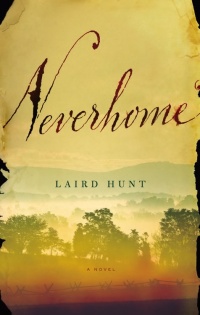Neverhome by Laird Hunt
 Monday, September 8, 2014 at 10:55AM
Monday, September 8, 2014 at 10:55AM 
Published by Little, Brown and Co. on September 9, 2014
Leaving Bartholomew to take care of the farm in Indiana, Ash Thompson goes off to join the war, defending the Republic against the Rebels. Ash is a better shot, a braver soul, and the logical choice to go to war if (as Ash believes) one of them must. Ash has a secret, but Laird Hunt doesn't try very hard to keep it a secret from the reader. Ash's true nature becomes likely within a few pages and is confirmed by additional clues as the story moves forward but not expressly revealed until a quarter of the novel has passed.
Ash, alternately gallant and deadly, offers a unique perspective on the horrors of war. Battles are fierce but Ash more often describes (and more fully absorbs) the aftermath of war: bodies strewn in fields, broken wagons, abandoned bugles, charred towns. After a time, the point of the war is lost on those like Ash who bear its ugliness. Yet every war has tender moments and Ash is better positioned than most soldiers to notice and appreciate them.
Ash notes that in books written after the war, "women are saints and angels and men are courageous noble folk and everything they do gets done nice and quick and nothing smells like blood." The story Ash tells is a counterpoint to the glory of war. It is a story of humanity lost and found. It showcases the evil of which men and women are capable (not just in war), but the evil is offset by gentle people and by the resilience of the human spirit. People are damaged by war but some, Ash observes, find ways to cope with the damage.
The story is told in the first person. Hunt manages the difficult trick of telling the story in an uneducated but convincing dialect while creating striking images and remarkable paragraphs. Neverhome is a short but eventful novel. Perhaps the novel is too short -- time is so collapsed that many scenes would have benefited from additional flesh -- although it leads to a conclusion that is both powerful and unexpected. Still, the novel's greatest strength is its characterization of Ash, a person who is both ordinary and extraordinary, an "uncommon soldier" (to borrow the title of a reference work Hunt credits) who refuses to turn away from battle, whose greatest virtue is the ability to confront adversity -- in and out of war -- head-on.
RECOMMENDED
 TChris |
TChris |  Post a Comment |
Post a Comment |  Laird Hunt in
Laird Hunt in  General Fiction
General Fiction
Reader Comments